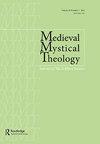The Eye with Which I See God is the Same Eye with Which God Sees Me: Meister Eckhart on Divine Awareness
IF 0.3
0 RELIGION
引用次数: 0
Abstract
This essay seeks to elicit the complexity, profundity, and subtlety at work in the title, so as to gain a more genuine understanding of what constitutes mystical knowledge and divine awareness for Eckhart. In part one I explore what Eckhart means by this line, and in the process disclose what he does not mean. In part two I explore the mystical implications of the line’s meaning. Throughout I draw from Eckhart’s own sermons and treatises, as well as scripture and works that have influenced his thinking. I also incorporate examples from other mystical traditions as analogies that help us to grasp what Eckhart is saying. My aim is to show the varying ways in which the mystical can be understood in Eckhart, and the extent to which these ways are significant to him. To conclude, I elucidate what Eckhart’s famous line in essence says and what it achieves.我看上帝的眼睛就是上帝看我的眼睛:埃克哈特先生谈神性意识
本文试图引出题目的复杂性、深度和微妙之处,从而更真实地理解是什么构成了埃克哈特的神秘知识和神圣意识。在第一部分中,我探讨了埃克哈特这句话的意思,并在此过程中揭示了他的意思。在第二部分中,我探讨了这句话的神秘含义。在整个过程中,我从埃克哈特自己的布道和论文,以及经文和作品中汲取灵感,这些都影响了他的思想。我还结合了其他神秘主义传统的例子作为类比,帮助我们理解埃克哈特所说的。我的目的是展示埃克哈特可以理解神秘主义的不同方式,以及这些方式对他的重要性。最后,我将阐明埃克哈特这句著名的名言在本质上说了什么,以及它实现了什么。
本文章由计算机程序翻译,如有差异,请以英文原文为准。
求助全文
约1分钟内获得全文
求助全文

 求助内容:
求助内容: 应助结果提醒方式:
应助结果提醒方式:


